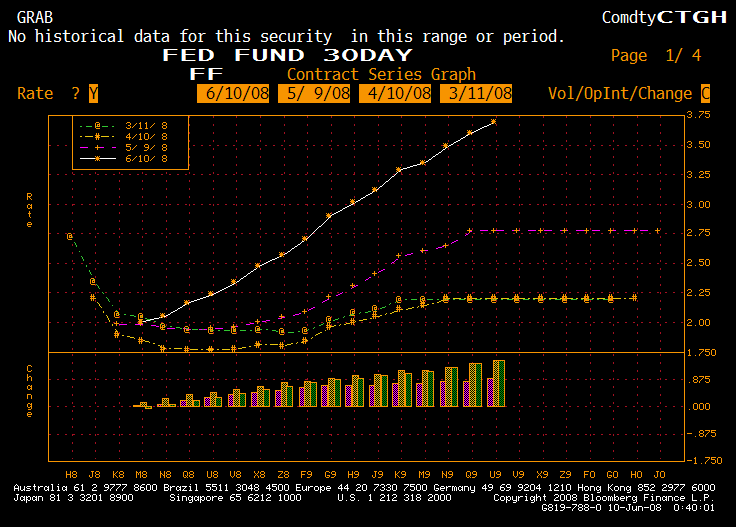First, an old RealMoney Columnist Conversation post:

 |
 |
David Merkel |
| Moody’s Downgrades XL Capital Assurance |
2/7/2008 3:34 PM EST
 |
When the main rating agencies begin downgrading the lesser guarantors, the big guarantors are likely not far behind. Moody’s just downgraded XL Capital Assurance from Aaa to A3, and Security Capital Assurance From Aa3 to Baa3 (barely investment grade).
Psychologically, the major rating agencies, Moody’s and S&P, have been taking baby steps toward downgrading Ambac, MBIA and FGIC. But first they have to do the lesser guarantors that are in trouble. As I have pointed out before, the major rating agencies are co-dependent with the major guarantors, and that will only throw the guarantors over the edge if hurts them more to leave the guarantors at AAA. That will cost them future revenues to cut the ratings of the major guarantors, but it might save their larger franchises. (Fitch, on the other hand, has less to lose and can downgrade with impunity.)
Now, the effects on the broader insured bond market are probably overestimated. There will be new entrants to take the place of the legacy companies that may have to go into runoff. The holding companies for the major guarantors could die, but a rescue of the operating insurance companies in runoff mode is more likely. Those who own equity in the holding companies or debt claims to the holding companies will not be happy with the results, though.
Watch for downgrades of the major guarantors. Unless a lot of new capital gets pumped into their operating insurance companies, the downgrades are coming, maybe within a month.
Please note that due to factors including low market capitalization and/or insufficient public float, we consider Security Capital Assurance to be a small-cap stock. You should be aware that such stocks are subject to more risk than stocks of larger companies, including greater volatility, lower liquidity and less publicly available information, and that postings such as this one can have an effect on their stock prices.
Position: none
And this comment that I left at WSJ MarketBeat on their article Ambac Falls on S&P 500 Deletion.
–
Now, consider this article from the AP, where they say: “Despite raising $1.5 billion in new capital in March, Ambac’s financial flexibility has deteriorated, Moody’s said. A decline in the firm’s market capitalization and high spreads on its debt securities makes it difficult for the company to address potential capital shortfalls.”
Also quoting from the post at Accrued Interest, quoting from the Moody’s report, “Moody’s stated that the ratings review was prompted, in part, by concerns about the deterioration in ABK’s financial flexibility since the company’s $1.5 billion capital raise in March 2008, as evidenced by the substantial decline in the firm’s market capitalization and high current spreads on its debt securities, making it increasingly difficult to economically address potential shortfalls in the company’s capital position should markets continue to worsen. Additionally, there is meaningful uncertainty surrounding Ambac’s ability to regain market acceptance and underwriting traction within its target markets.”
Now, maybe I’m nuts, but when I think of debt ratings, I don’t want to directly consider the ability to raise new equity capital as a significant factor in my rating decisions.? Why?? Because deterioration can happen slowly, but it doesn’t have to.? Companies the are AAA or AA should be beyond the possibility of having to do a forced equity raise in anything short of a depression.? Aside from that, the decision to raise equity capital is discretionary, and managements rarely do it at the right time — when things are going well.
Naked Capitalism calls it the Monoline Death Watch, and Yves is spot-on.? For financial guarantors, ratings are a slippery slope.? You can go down, but you can’t easily go up.? MBIA and Ambac are close to being in runoff now.? Losing the AAA from either agency will seal that.? Also, once one agency downgrades, the other will quickly follow.? There will be new start-ups, but for now Berky, Dexia, and Assured Guaranty will make hay while the sun shines — they are the new oligopoly, and won’t do structured finance, for now.
PS — If indeed FASB eliminates QSPEs by modifying SFAS 140, and if there are no financial guarantors willing to do structured finance, then what happens to securitization?? It is too useful of an idea to disappear.? I don’t think it will disappear; I just don’t know the form in which it will reappear.? I’ll toss out this idea: Wall Street creates a bunch of small cap companies to own the assets, and the tranches, are simply different levels of subordinated debt.



Can we get the equity side of S&P to chat with the debt ratings side? Debt ratings always have a bias toward bigger firms, and Ambac is no longer big enough to rate being in the S&P 500.
Quick, name another corporation that is AAA that is not in the S&P 500. Berkshire Hathaway, but that is because the float is small? but wait, Ambac the holding company is only AA, their regulated subsidiaries are AAA.
Are there any AA- or better US publicly traded corporations not in the S&P 500? One AA ? Genentech. Three AA-: MGE Energy, WGL Holdings, and Northwestern Natural Gas? two utilities and a gas pipeline. Decidedly more stable businesses than Ambac.
So, S&P debt ratings, take the hint from your corporate brother, and downgrade Ambac.